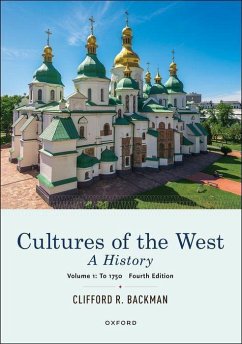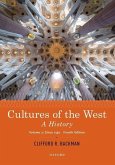- Broschiertes Buch
Andere Kunden interessierten sich auch für
![Cultures of the West Cultures of the West]() Clifford BackmanCultures of the West91,99 €
Clifford BackmanCultures of the West91,99 €![The Routledge Companion to Media and Fairy-Tale Cultures The Routledge Companion to Media and Fairy-Tale Cultures]() The Routledge Companion to Media and Fairy-Tale Cultures70,99 €
The Routledge Companion to Media and Fairy-Tale Cultures70,99 €![The Human Genetic Mutant Cell Repository: List of Genetic Variants, Chromosomal Aberrations and Normal Cell Cultures Submitted to the Repository: 4th The Human Genetic Mutant Cell Repository: List of Genetic Variants, Chromosomal Aberrations and Normal Cell Cultures Submitted to the Repository: 4th]() The Human Genetic Mutant Cell Repository: List of Genetic Variants, Chromosomal Aberrations and Normal Cell Cultures Submitted to the Repository: 4th20,99 €
The Human Genetic Mutant Cell Repository: List of Genetic Variants, Chromosomal Aberrations and Normal Cell Cultures Submitted to the Repository: 4th20,99 €![A Comparison Of The Relative Toxicity Of Certain Substances In Soil And Water Cultures A Comparison Of The Relative Toxicity Of Certain Substances In Soil And Water Cultures]() Leonard Frederick GiesekerA Comparison Of The Relative Toxicity Of Certain Substances In Soil And Water Cultures21,99 €
Leonard Frederick GiesekerA Comparison Of The Relative Toxicity Of Certain Substances In Soil And Water Cultures21,99 €![The Clash of Cultures on the Medieval Baltic Frontier The Clash of Cultures on the Medieval Baltic Frontier]() The Clash of Cultures on the Medieval Baltic Frontier64,99 €
The Clash of Cultures on the Medieval Baltic Frontier64,99 €![A Study Of The Optical Forms Of Lactic Acid Produced By Pure Cultures Of Bacillus Bulgaricus A Study Of The Optical Forms Of Lactic Acid Produced By Pure Cultures Of Bacillus Bulgaricus]() James Nimrod CurrieA Study Of The Optical Forms Of Lactic Acid Produced By Pure Cultures Of Bacillus Bulgaricus16,99 €
James Nimrod CurrieA Study Of The Optical Forms Of Lactic Acid Produced By Pure Cultures Of Bacillus Bulgaricus16,99 €![Memory Cultures Memory Cultures]() Memory Cultures71,99 €
Memory Cultures71,99 €-
-
-
Produktdetails
- Verlag: Oxford University Press Inc
- Seitenzahl: 736
- Erscheinungstermin: 17. Oktober 2023
- Englisch
- Abmessung: 167mm x 235mm x 30mm
- Gewicht: 1048g
- ISBN-13: 9780197668429
- ISBN-10: 0197668429
- Artikelnr.: 69188240
Hinweis: Dieser Artikel kann nur an eine deutsche Lieferadresse ausgeliefert werden.
Clifford R. Backman is Associate Professor of History at Boston University, where he has been a member of the department since 1989. He is currently at work on a book that traces the development of toleration and interpersonal forgiveness in medieval Christianity, Judaism, and Islam.
Contents
Maps
Preface
About the Author
Note on Dates
Prologue: Before History
1. Water and Soil, Stone and Metal:
The First Civilizations
10,000-1200 bce
Ancient Mesopotamia and the Emergence of Civilization
Mesopotamian Life: Farms and Cities, Writing and Numbers
Mesopotamian Religion: Heaven, the Great Above, the Great Below
From Sumer to Old Babylon
Ancient Egypt, Gift of the Nile
Old Kingdom Egypt
Egyptian Religion: The Kingdom of the Dead
Middle Kingdom Egypt
The New Kingdom Empire
The Indo-European Irruption
The Age of Iron Begins
2. The Monotheists: Jews and Persians
1200-550 bce
The Bible and History
The Promised Land
Dreams of a Golden Age
Women and the Law
Prophets and Prophecy
The Struggle for Jewish Identity
Persia and the Religion of Fire
3. The Ancient Greeks: From Arrival to Glory
2000-479 bce
The First Greeks
The Search for Mythic Ancestors in Archaic Age Greece
Colonists, Hoplites, and the Path to Citizenship
A Cult of Masculinity
Civilized Pursuits: Lyric Poetry
Sparta: A Militarized Citizenry
Miletus: The Birthplace of Philosophy
Athens: Home to Democracy
The Persian Wars
4. The Classical and Hellenistic Ages
479-30 bce
Athens's Golden Age
The Polis: Ritual and Restraint
The Excluded: Women, Children, and the Enslaved
The Invention of Drama
The Peloponnesian Disaster
Advances in Historical Inquiry
Medicine as Natural Law
The Flowering of Greek Philosophy
The Rise of Macedonia and the Conquests of Alexander the Great
The Hellenistic World
The Maccabean Revolt
Second Temple Judaism
5. Romans and Republicans
753-27 bce
Ancient Italy and the Rise of Rome
From Monarchy to Republic
The Republic of Virtue
Size Matters
Can the Republic Be Saved?
6. Rome's Empire
27 bce-305 ce
Rome's Golden Age: The Augustan Era
The Sea, the Sea
Roman Lives and Values
Height of the Pax Romana: The "Five Good Emperors"
Life and Economy
The Time of Troubles
7. The Rise of Christianity in a Roman World
40 bce-300 ce
The Vitality of Roman Religion
The Jesus Mystery
A Crisis in Tradition
Ministry and Movement
What Happened to His Disciples?
Christianities Everywhere
Romans in Pursuit
Philosophical Foundations: Stoicism and Neoplatonism
8. The Early Middle Ages
300-750
Imperial Decline: Rome's Overreach
A Christian Emperor and a Christian Church
The Rise of "New Rome": The Byzantine Empire
Barbarian Kings and Warlords
Divided Estates and Kingdoms
Germanic Law
Christian Paganism
Christian Monasticism
9. The Expansive Realm of Islam
To 900 ce
"Age of Ignorance": The Arabian Background
The Qur'an and History
From Preacher to Conqueror
Conversion or Compulsion?
The Islamic Empire
Sunnis and Shi'a
Islam and the Classical Traditions
Women and Islam
10. Reform and Renewal in the Greater West
750-1258
Two Palace Coups and the Carolingian Ascent
Charlemagne and Imperial Coronation
Carolingian Collapse
The Splintering of the Caliphate
The Reinvention of Western Europe
Mediterranean Cities
The Reinvention of the Church
The Reinvention of the Islamic World
The Call for Crusades
The Crusades
Turkish Power and Byzantine Decline
Judaism Reformed, Renewed, and Reviled
The Emergence of the Slavs
11. Worlds Brought Down
1258-1453
Late Medieval Europe
Scholasticism and Mysticism
The Guild System
The Mendicant Orders
Early Representative Government
The Weakening of the Papacy
Noble Privilege and Popular Rebellion
The Hundred Years' War
The Plague
The Mongol Takeover
A New Center for Islam
The Ottoman Turks
12. Renaissances and Reformations
1350-1563
Rebirth or Culmination?
The Political and Economic Matrix
The Renaissance Achievement
Christian Humanism
Erasmus: Humanist Scholar and Social Critic
Martin Luther: The Gift of Salvation
Luther's Rebellion against the Church
The Reformation Goes International
Calvin and "The Elect"
Strife and Settlement in England
Catholic Reform and the Council of Trent
The Society of Jesus
What About the Catholic and Orthodox East?
13. Worlds Old and New
1450-1700
European Voyages of Discovery
New Continents and Profits
Conquest and Epidemics
The Copernican Drama
Galileo and the Truth of Numbers
Inquisition and Inquiry
The Revolution Broadens
The Ethical Costs of Science
The Islamic Retreat from Science
Thinking About Truth
Newton's Mathematical Principles
14. The Wars of All against All
1540-1648
The Godly Society
From the Peace of Augsburg to the Edict of Nantes: The French Wars of Religion
Dutch Ascendancy and Spanish Eclipse
The Thirty Years' War
Enemies Within: The Hunt for Witches
The Jews of the East and West
The Waning of the Sultanate
New Centers of Intellectual and Cultural Life
Wars of Religion: The Eastern Front
Economic Change in an Atlantic World
15. From Westphalia to Paris: Regimes Old and New
1648-1750
The Peace of Westphalia: 1648
The Argument for Tyranny
The Social Contract
Absolute Politics
Police States
Self-Indulgence with a Purpose: The Example of Versailles
Paying for Absolutism
Mercantilism and Poverty
International Trade in a Mercantilist Age
The Slave Trade and Domestic Subjugation
Domesticating Dynamism: Regulating Culture
The Control of Private Life
England's Separate Path: The Rise of Constitutional Monarchy
Ottoman and Persian Absolutism
The Return of Uncertainty
Reference Maps
Appendix: Table of Contents for Sources for Cultures of the West
Glossary
Credits
Index
Maps
Preface
About the Author
Note on Dates
Prologue: Before History
1. Water and Soil, Stone and Metal:
The First Civilizations
10,000-1200 bce
Ancient Mesopotamia and the Emergence of Civilization
Mesopotamian Life: Farms and Cities, Writing and Numbers
Mesopotamian Religion: Heaven, the Great Above, the Great Below
From Sumer to Old Babylon
Ancient Egypt, Gift of the Nile
Old Kingdom Egypt
Egyptian Religion: The Kingdom of the Dead
Middle Kingdom Egypt
The New Kingdom Empire
The Indo-European Irruption
The Age of Iron Begins
2. The Monotheists: Jews and Persians
1200-550 bce
The Bible and History
The Promised Land
Dreams of a Golden Age
Women and the Law
Prophets and Prophecy
The Struggle for Jewish Identity
Persia and the Religion of Fire
3. The Ancient Greeks: From Arrival to Glory
2000-479 bce
The First Greeks
The Search for Mythic Ancestors in Archaic Age Greece
Colonists, Hoplites, and the Path to Citizenship
A Cult of Masculinity
Civilized Pursuits: Lyric Poetry
Sparta: A Militarized Citizenry
Miletus: The Birthplace of Philosophy
Athens: Home to Democracy
The Persian Wars
4. The Classical and Hellenistic Ages
479-30 bce
Athens's Golden Age
The Polis: Ritual and Restraint
The Excluded: Women, Children, and the Enslaved
The Invention of Drama
The Peloponnesian Disaster
Advances in Historical Inquiry
Medicine as Natural Law
The Flowering of Greek Philosophy
The Rise of Macedonia and the Conquests of Alexander the Great
The Hellenistic World
The Maccabean Revolt
Second Temple Judaism
5. Romans and Republicans
753-27 bce
Ancient Italy and the Rise of Rome
From Monarchy to Republic
The Republic of Virtue
Size Matters
Can the Republic Be Saved?
6. Rome's Empire
27 bce-305 ce
Rome's Golden Age: The Augustan Era
The Sea, the Sea
Roman Lives and Values
Height of the Pax Romana: The "Five Good Emperors"
Life and Economy
The Time of Troubles
7. The Rise of Christianity in a Roman World
40 bce-300 ce
The Vitality of Roman Religion
The Jesus Mystery
A Crisis in Tradition
Ministry and Movement
What Happened to His Disciples?
Christianities Everywhere
Romans in Pursuit
Philosophical Foundations: Stoicism and Neoplatonism
8. The Early Middle Ages
300-750
Imperial Decline: Rome's Overreach
A Christian Emperor and a Christian Church
The Rise of "New Rome": The Byzantine Empire
Barbarian Kings and Warlords
Divided Estates and Kingdoms
Germanic Law
Christian Paganism
Christian Monasticism
9. The Expansive Realm of Islam
To 900 ce
"Age of Ignorance": The Arabian Background
The Qur'an and History
From Preacher to Conqueror
Conversion or Compulsion?
The Islamic Empire
Sunnis and Shi'a
Islam and the Classical Traditions
Women and Islam
10. Reform and Renewal in the Greater West
750-1258
Two Palace Coups and the Carolingian Ascent
Charlemagne and Imperial Coronation
Carolingian Collapse
The Splintering of the Caliphate
The Reinvention of Western Europe
Mediterranean Cities
The Reinvention of the Church
The Reinvention of the Islamic World
The Call for Crusades
The Crusades
Turkish Power and Byzantine Decline
Judaism Reformed, Renewed, and Reviled
The Emergence of the Slavs
11. Worlds Brought Down
1258-1453
Late Medieval Europe
Scholasticism and Mysticism
The Guild System
The Mendicant Orders
Early Representative Government
The Weakening of the Papacy
Noble Privilege and Popular Rebellion
The Hundred Years' War
The Plague
The Mongol Takeover
A New Center for Islam
The Ottoman Turks
12. Renaissances and Reformations
1350-1563
Rebirth or Culmination?
The Political and Economic Matrix
The Renaissance Achievement
Christian Humanism
Erasmus: Humanist Scholar and Social Critic
Martin Luther: The Gift of Salvation
Luther's Rebellion against the Church
The Reformation Goes International
Calvin and "The Elect"
Strife and Settlement in England
Catholic Reform and the Council of Trent
The Society of Jesus
What About the Catholic and Orthodox East?
13. Worlds Old and New
1450-1700
European Voyages of Discovery
New Continents and Profits
Conquest and Epidemics
The Copernican Drama
Galileo and the Truth of Numbers
Inquisition and Inquiry
The Revolution Broadens
The Ethical Costs of Science
The Islamic Retreat from Science
Thinking About Truth
Newton's Mathematical Principles
14. The Wars of All against All
1540-1648
The Godly Society
From the Peace of Augsburg to the Edict of Nantes: The French Wars of Religion
Dutch Ascendancy and Spanish Eclipse
The Thirty Years' War
Enemies Within: The Hunt for Witches
The Jews of the East and West
The Waning of the Sultanate
New Centers of Intellectual and Cultural Life
Wars of Religion: The Eastern Front
Economic Change in an Atlantic World
15. From Westphalia to Paris: Regimes Old and New
1648-1750
The Peace of Westphalia: 1648
The Argument for Tyranny
The Social Contract
Absolute Politics
Police States
Self-Indulgence with a Purpose: The Example of Versailles
Paying for Absolutism
Mercantilism and Poverty
International Trade in a Mercantilist Age
The Slave Trade and Domestic Subjugation
Domesticating Dynamism: Regulating Culture
The Control of Private Life
England's Separate Path: The Rise of Constitutional Monarchy
Ottoman and Persian Absolutism
The Return of Uncertainty
Reference Maps
Appendix: Table of Contents for Sources for Cultures of the West
Glossary
Credits
Index
Contents
Maps
Preface
About the Author
Note on Dates
Prologue: Before History
1. Water and Soil, Stone and Metal:
The First Civilizations
10,000-1200 bce
Ancient Mesopotamia and the Emergence of Civilization
Mesopotamian Life: Farms and Cities, Writing and Numbers
Mesopotamian Religion: Heaven, the Great Above, the Great Below
From Sumer to Old Babylon
Ancient Egypt, Gift of the Nile
Old Kingdom Egypt
Egyptian Religion: The Kingdom of the Dead
Middle Kingdom Egypt
The New Kingdom Empire
The Indo-European Irruption
The Age of Iron Begins
2. The Monotheists: Jews and Persians
1200-550 bce
The Bible and History
The Promised Land
Dreams of a Golden Age
Women and the Law
Prophets and Prophecy
The Struggle for Jewish Identity
Persia and the Religion of Fire
3. The Ancient Greeks: From Arrival to Glory
2000-479 bce
The First Greeks
The Search for Mythic Ancestors in Archaic Age Greece
Colonists, Hoplites, and the Path to Citizenship
A Cult of Masculinity
Civilized Pursuits: Lyric Poetry
Sparta: A Militarized Citizenry
Miletus: The Birthplace of Philosophy
Athens: Home to Democracy
The Persian Wars
4. The Classical and Hellenistic Ages
479-30 bce
Athens's Golden Age
The Polis: Ritual and Restraint
The Excluded: Women, Children, and the Enslaved
The Invention of Drama
The Peloponnesian Disaster
Advances in Historical Inquiry
Medicine as Natural Law
The Flowering of Greek Philosophy
The Rise of Macedonia and the Conquests of Alexander the Great
The Hellenistic World
The Maccabean Revolt
Second Temple Judaism
5. Romans and Republicans
753-27 bce
Ancient Italy and the Rise of Rome
From Monarchy to Republic
The Republic of Virtue
Size Matters
Can the Republic Be Saved?
6. Rome's Empire
27 bce-305 ce
Rome's Golden Age: The Augustan Era
The Sea, the Sea
Roman Lives and Values
Height of the Pax Romana: The "Five Good Emperors"
Life and Economy
The Time of Troubles
7. The Rise of Christianity in a Roman World
40 bce-300 ce
The Vitality of Roman Religion
The Jesus Mystery
A Crisis in Tradition
Ministry and Movement
What Happened to His Disciples?
Christianities Everywhere
Romans in Pursuit
Philosophical Foundations: Stoicism and Neoplatonism
8. The Early Middle Ages
300-750
Imperial Decline: Rome's Overreach
A Christian Emperor and a Christian Church
The Rise of "New Rome": The Byzantine Empire
Barbarian Kings and Warlords
Divided Estates and Kingdoms
Germanic Law
Christian Paganism
Christian Monasticism
9. The Expansive Realm of Islam
To 900 ce
"Age of Ignorance": The Arabian Background
The Qur'an and History
From Preacher to Conqueror
Conversion or Compulsion?
The Islamic Empire
Sunnis and Shi'a
Islam and the Classical Traditions
Women and Islam
10. Reform and Renewal in the Greater West
750-1258
Two Palace Coups and the Carolingian Ascent
Charlemagne and Imperial Coronation
Carolingian Collapse
The Splintering of the Caliphate
The Reinvention of Western Europe
Mediterranean Cities
The Reinvention of the Church
The Reinvention of the Islamic World
The Call for Crusades
The Crusades
Turkish Power and Byzantine Decline
Judaism Reformed, Renewed, and Reviled
The Emergence of the Slavs
11. Worlds Brought Down
1258-1453
Late Medieval Europe
Scholasticism and Mysticism
The Guild System
The Mendicant Orders
Early Representative Government
The Weakening of the Papacy
Noble Privilege and Popular Rebellion
The Hundred Years' War
The Plague
The Mongol Takeover
A New Center for Islam
The Ottoman Turks
12. Renaissances and Reformations
1350-1563
Rebirth or Culmination?
The Political and Economic Matrix
The Renaissance Achievement
Christian Humanism
Erasmus: Humanist Scholar and Social Critic
Martin Luther: The Gift of Salvation
Luther's Rebellion against the Church
The Reformation Goes International
Calvin and "The Elect"
Strife and Settlement in England
Catholic Reform and the Council of Trent
The Society of Jesus
What About the Catholic and Orthodox East?
13. Worlds Old and New
1450-1700
European Voyages of Discovery
New Continents and Profits
Conquest and Epidemics
The Copernican Drama
Galileo and the Truth of Numbers
Inquisition and Inquiry
The Revolution Broadens
The Ethical Costs of Science
The Islamic Retreat from Science
Thinking About Truth
Newton's Mathematical Principles
14. The Wars of All against All
1540-1648
The Godly Society
From the Peace of Augsburg to the Edict of Nantes: The French Wars of Religion
Dutch Ascendancy and Spanish Eclipse
The Thirty Years' War
Enemies Within: The Hunt for Witches
The Jews of the East and West
The Waning of the Sultanate
New Centers of Intellectual and Cultural Life
Wars of Religion: The Eastern Front
Economic Change in an Atlantic World
15. From Westphalia to Paris: Regimes Old and New
1648-1750
The Peace of Westphalia: 1648
The Argument for Tyranny
The Social Contract
Absolute Politics
Police States
Self-Indulgence with a Purpose: The Example of Versailles
Paying for Absolutism
Mercantilism and Poverty
International Trade in a Mercantilist Age
The Slave Trade and Domestic Subjugation
Domesticating Dynamism: Regulating Culture
The Control of Private Life
England's Separate Path: The Rise of Constitutional Monarchy
Ottoman and Persian Absolutism
The Return of Uncertainty
Reference Maps
Appendix: Table of Contents for Sources for Cultures of the West
Glossary
Credits
Index
Maps
Preface
About the Author
Note on Dates
Prologue: Before History
1. Water and Soil, Stone and Metal:
The First Civilizations
10,000-1200 bce
Ancient Mesopotamia and the Emergence of Civilization
Mesopotamian Life: Farms and Cities, Writing and Numbers
Mesopotamian Religion: Heaven, the Great Above, the Great Below
From Sumer to Old Babylon
Ancient Egypt, Gift of the Nile
Old Kingdom Egypt
Egyptian Religion: The Kingdom of the Dead
Middle Kingdom Egypt
The New Kingdom Empire
The Indo-European Irruption
The Age of Iron Begins
2. The Monotheists: Jews and Persians
1200-550 bce
The Bible and History
The Promised Land
Dreams of a Golden Age
Women and the Law
Prophets and Prophecy
The Struggle for Jewish Identity
Persia and the Religion of Fire
3. The Ancient Greeks: From Arrival to Glory
2000-479 bce
The First Greeks
The Search for Mythic Ancestors in Archaic Age Greece
Colonists, Hoplites, and the Path to Citizenship
A Cult of Masculinity
Civilized Pursuits: Lyric Poetry
Sparta: A Militarized Citizenry
Miletus: The Birthplace of Philosophy
Athens: Home to Democracy
The Persian Wars
4. The Classical and Hellenistic Ages
479-30 bce
Athens's Golden Age
The Polis: Ritual and Restraint
The Excluded: Women, Children, and the Enslaved
The Invention of Drama
The Peloponnesian Disaster
Advances in Historical Inquiry
Medicine as Natural Law
The Flowering of Greek Philosophy
The Rise of Macedonia and the Conquests of Alexander the Great
The Hellenistic World
The Maccabean Revolt
Second Temple Judaism
5. Romans and Republicans
753-27 bce
Ancient Italy and the Rise of Rome
From Monarchy to Republic
The Republic of Virtue
Size Matters
Can the Republic Be Saved?
6. Rome's Empire
27 bce-305 ce
Rome's Golden Age: The Augustan Era
The Sea, the Sea
Roman Lives and Values
Height of the Pax Romana: The "Five Good Emperors"
Life and Economy
The Time of Troubles
7. The Rise of Christianity in a Roman World
40 bce-300 ce
The Vitality of Roman Religion
The Jesus Mystery
A Crisis in Tradition
Ministry and Movement
What Happened to His Disciples?
Christianities Everywhere
Romans in Pursuit
Philosophical Foundations: Stoicism and Neoplatonism
8. The Early Middle Ages
300-750
Imperial Decline: Rome's Overreach
A Christian Emperor and a Christian Church
The Rise of "New Rome": The Byzantine Empire
Barbarian Kings and Warlords
Divided Estates and Kingdoms
Germanic Law
Christian Paganism
Christian Monasticism
9. The Expansive Realm of Islam
To 900 ce
"Age of Ignorance": The Arabian Background
The Qur'an and History
From Preacher to Conqueror
Conversion or Compulsion?
The Islamic Empire
Sunnis and Shi'a
Islam and the Classical Traditions
Women and Islam
10. Reform and Renewal in the Greater West
750-1258
Two Palace Coups and the Carolingian Ascent
Charlemagne and Imperial Coronation
Carolingian Collapse
The Splintering of the Caliphate
The Reinvention of Western Europe
Mediterranean Cities
The Reinvention of the Church
The Reinvention of the Islamic World
The Call for Crusades
The Crusades
Turkish Power and Byzantine Decline
Judaism Reformed, Renewed, and Reviled
The Emergence of the Slavs
11. Worlds Brought Down
1258-1453
Late Medieval Europe
Scholasticism and Mysticism
The Guild System
The Mendicant Orders
Early Representative Government
The Weakening of the Papacy
Noble Privilege and Popular Rebellion
The Hundred Years' War
The Plague
The Mongol Takeover
A New Center for Islam
The Ottoman Turks
12. Renaissances and Reformations
1350-1563
Rebirth or Culmination?
The Political and Economic Matrix
The Renaissance Achievement
Christian Humanism
Erasmus: Humanist Scholar and Social Critic
Martin Luther: The Gift of Salvation
Luther's Rebellion against the Church
The Reformation Goes International
Calvin and "The Elect"
Strife and Settlement in England
Catholic Reform and the Council of Trent
The Society of Jesus
What About the Catholic and Orthodox East?
13. Worlds Old and New
1450-1700
European Voyages of Discovery
New Continents and Profits
Conquest and Epidemics
The Copernican Drama
Galileo and the Truth of Numbers
Inquisition and Inquiry
The Revolution Broadens
The Ethical Costs of Science
The Islamic Retreat from Science
Thinking About Truth
Newton's Mathematical Principles
14. The Wars of All against All
1540-1648
The Godly Society
From the Peace of Augsburg to the Edict of Nantes: The French Wars of Religion
Dutch Ascendancy and Spanish Eclipse
The Thirty Years' War
Enemies Within: The Hunt for Witches
The Jews of the East and West
The Waning of the Sultanate
New Centers of Intellectual and Cultural Life
Wars of Religion: The Eastern Front
Economic Change in an Atlantic World
15. From Westphalia to Paris: Regimes Old and New
1648-1750
The Peace of Westphalia: 1648
The Argument for Tyranny
The Social Contract
Absolute Politics
Police States
Self-Indulgence with a Purpose: The Example of Versailles
Paying for Absolutism
Mercantilism and Poverty
International Trade in a Mercantilist Age
The Slave Trade and Domestic Subjugation
Domesticating Dynamism: Regulating Culture
The Control of Private Life
England's Separate Path: The Rise of Constitutional Monarchy
Ottoman and Persian Absolutism
The Return of Uncertainty
Reference Maps
Appendix: Table of Contents for Sources for Cultures of the West
Glossary
Credits
Index








